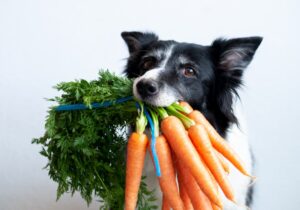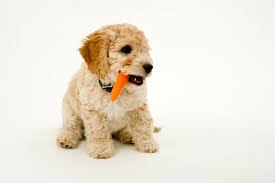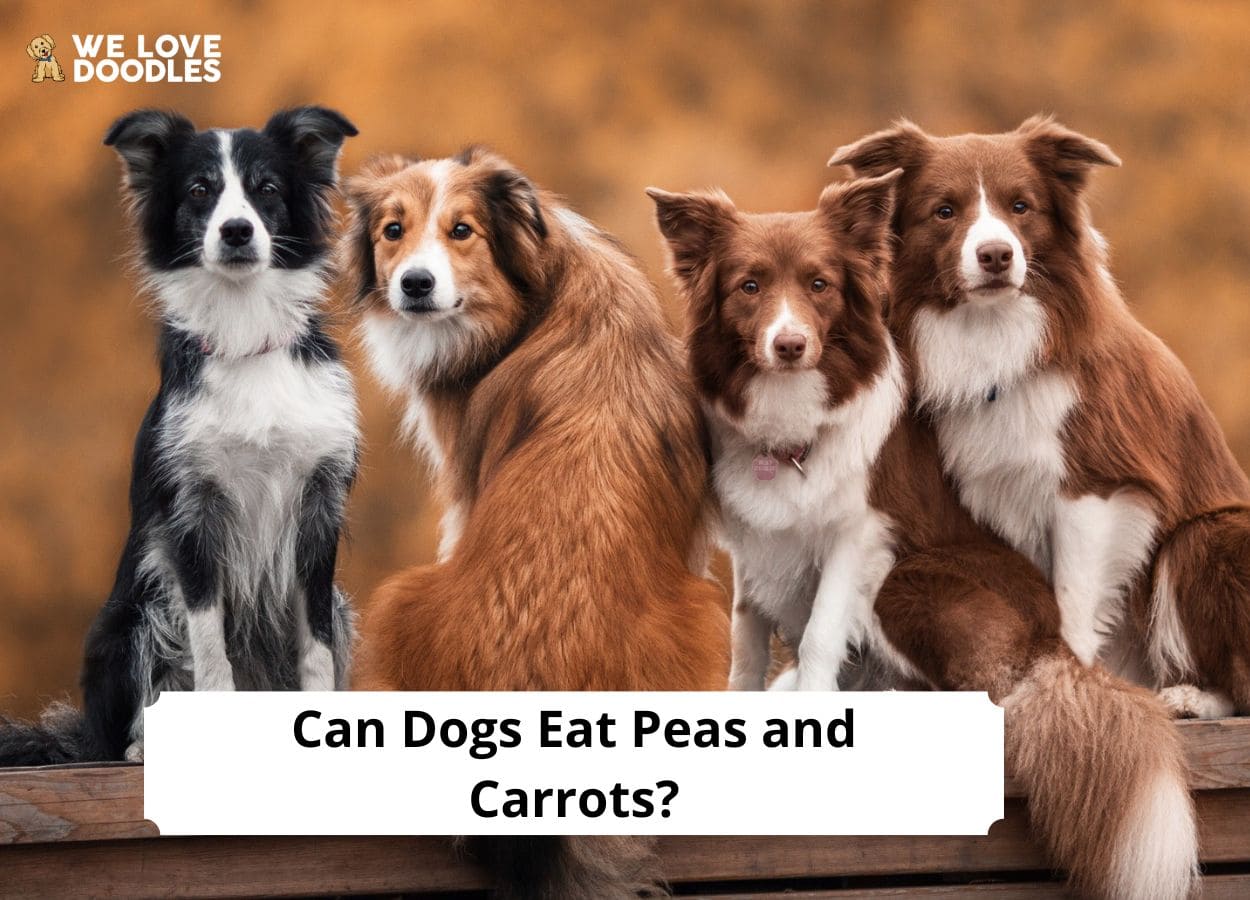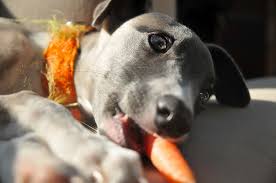Many dogs try to eat anything and everything in their path. That behavior can be problematic if they eat dangerous items, but some foods may benefit a pup. It’s hard to know which foods are good or bad for dogs. For example, can dogs eat peas and carrots?
Here is everything you need to know about how eating peas and carrots can affect dogs.
Before you scroll further down this guide, “Can Dogs Eat Peas and Carrots,” you can check out these other dog-related questions from our team at We Love Doodles: Can Dogs Eat Bratwurst and Can Dogs Eat Capers?
Can Dogs Eat Carrots?

Besides their nutritional value, the hard texture of the carrot can be beneficial for your dog’s teeth. This root can also be a good choice if you want a new treat or chew toy option. Teething puppies may enjoy a frozen carrot if they are teething.
Before giving your puppy a carrot, it is essential to wash the vegetable. Doing so will clean off any pesticides and dirt. You can also peel it if you want.
While a whole carrot is fine if you want your dog to use it for their teeth, you should avoid carrots that are chokeable in size. Cut carrots down to a size appropriate for the size of your dog.
If you are worried about your dog choking on carrots, try cooking a carrot and mushing it into a safe texture. As with any food you cook for your dog, avoid cooking carrots in butter or oil and refrain from adding any seasoning.
Dogs do not care about the taste of those additions. Fats and seasonings can be harmful to your puppy. Stick to steaming, boiling, and roasting, and always cool down the carrots before giving them to your dog.
More Dog-Related Questions: Can Dogs Eat Pita Bread and Can Dogs Eat Hearts of Palm?
Is It Okay To Give Your Dog Carrots Every Day?

You can also cut them up small or cook them and add them to your dog’s food. Always talk to your vet about the right carrots to give your dog a day.
More Dog-Related Questions: Can Dogs Eat Ranch and Can Dogs Eat Salami?
Can a Dog Eat Too Many Carrots?

The right amount of carrots will vary from dog to dog. In general, larger dogs can eat more carrots than smaller dogs. Certain breeds are prone to more digestive sensitivity than others.
When you first try to give your dog carrots, try giving them a small amount at first and wait a few hours to see how they feel. Check their stool to see if there is any noticeable difference. You can give them more if everything seems fine and continue gauging the result.
More Dog-Related Questions: Can Dogs Eat Slime and Can Dogs Eat Canned Chicken?
Can Dogs Eat Peas?

Any variety of fresh peas is alright to give your dog. However, only give them pea pods that you can also chew. Difficult-to-eat pods can be a choking hazard. Frozen and thawed peas are also fine for dogs. However, canned peas are bad for your dog’s health since they contain salt.
You should not add salt or other seasonings to your peas to avoid salt. It is also good to steer clear of oil, butter, and other fats when preparing peas. Plain peas are preferred. If you cook them, use a method that does not add anything to the pea, such as steaming.
Peas make a good little treat substitute, especially in training. Other serving suggestions include adding the peas to their food, mushing them into an activity mat, and mixing peas with small bites of other vegetables, such as carrots.
A few cases exist when peas are not the right choice for a dog. Those dogs that can eat peas benefit from vitamin A, vitamin B, potassium, zinc, iron, lutein, dietary fiber, protein, manganese, and magnesium. These chemicals can benefit your dog’s health, including the heart, skin, and eyes.
More Dog-Related Questions: Can Dogs Eat Raw Chicken Breast and Can Dogs Eat Clover?
Why Are Peas Not Good For Dogs?

Some dogs should avoid peas since they contain purines, which produce uric acid. While purines and uric acid are not necessarily bad, they can exacerbate kidney issues since they filter through the kidneys.
As a result, peas can contribute to kidney stones or other damage in dogs with kidney issues. Moderation is especially essential with peas since there is some evidence to suggest that an excess of peas can cause health issues, including a taurine deficiency.
Those issues should only arise if you feed your dog an excess of peas and other legumes. A few peas as a treat should not have the same negative impact. Another issue presented by peas is they can be chokeable for some dogs.
You may want to mash some peas for very small dogs rather than presenting them whole. When giving them pea shells, ensure they are safe and chewable.
More Dog-Related Questions: Can Dogs Eat Sugar Cane and Can Dogs Eat Goldfish Crackers?
Health Benefits of Peas and Carrots for Dogs

Health benefits of peas
- Vitamin A is essential for eye care, development, immune well-being, and other cell operations.
- Vitamin Bs, such as thiamine, plays an essential role in the metabolism and regulating ion channels.
- Potassium helps your body regulate fluids in your body. It also encourages blood clotting.
- Fiber is a big help with healthy digestion for your dog.
- Protein is a major benefit of eating peas because it facilitates several elements of your dog’s body.
Health benefits of carrots
- The texture of carrots helps clean a dog’s teeth. Clean teeth can reduce the risk of several health issues, including heart disease.
- The fiber in carrots contributes to gastrointestinal health and can help with weight loss and blood sugar levels.
- Vitamin A works hard to provide your puppy with good health in many ways. This nutrient contributes to epithelial health, reproduction, and growth.
- Potassium impacts how the body deals with water, keeping fluids in balance, blood pressure, nerve signals, and muscle movement.
How Many Peas and Carrots Can Dogs Eat?

An average dog between 20 and 50 pounds can have one large carrot or two or three baby carrots daily. Smaller dogs should eat less than that, and larger dogs can have more.
Dogs are somewhat more sensitive to peas than carrots. So, you should only give them one teaspoon and a tablespoon of peas daily. The smaller the dog, the smaller the number of peas you should give them.
More Dog-Related Questions: Can Dogs Eat Free-Dried Strawberries and Can Dogs Eat Sprinkles?
What Vegetables Can Dogs Eat Every Day?

- Broccoli helps the heart health and bone density of dogs thanks to the presence of potassium and vitamin C.
- Spinach is one of the best vegetables you can give your puppy. It contains B vitamins, vitamin C, potassium, iron, calcium, and magnesium.
- Beets are worth trying for your dog since the vitamin C, potassium, manganese, fiber, and folate support the immune system and digestion.
- Besides providing hydration, cucumbers are also anti-inflammatory, thanks to antioxidants and phytonutrients.
- Kale is another green ideal for dogs since it helps fetal development, good vision, and immune health. This vegetable has vitamin A, potassium, and iron.
More Dog-Related Questions: Best Dog Scooting Treatments and Best Pee Pad Holders For Dogs.
Can Dogs Eat Peas And Carrots Every Day?

Always talk to your vet before adding elements to your dog’s diet. Depending on your dog’s health, breed, nutritional needs, temperament, and other factors, they may have specific suggestions. A vet will also have some ideas about the amount of these vegetables you should give your puppy.
More Dog-Related Questions: Can Dogs Eat Corn Starch?
Conclusion For “Can Dogs Eat Peas and Carrots”
So, can dogs eat peas and carrots? Yes, dogs can eat both peas and carrots. While there are some exceptions, these vegetables can provide important nutrients to your dog’s diet and be a fun treat. Remember that vegetables are not essential to the dog diet. So, if your puppy turns its nose at peas and carrots, that is fine too.
If you find this article, “Can Dogs Eat Peas and Carrots,” helpful, you can check out these other dog-related guides from our team:
Before you decide to feed your dog things like peas and carrots, you can learn more about what you can or cannot feed your dog by watching “Human Foods That Are Actually Good For Dogs” down below:

Dr. Sabrina Kong graduated from the Royal Veterinary College in England in 2016 and has been working at a small animal clinic in Northern California since then. She grew up in the Bay Area and got her bachelor’s degree from Cal Poly San Luis Obispo. She also became a Certified Canine Rehabilitation Practitioner through a program at the University of Tennessee.
When she isn’t in the clinic taking care of her four-legged patients, she enjoys traveling and trying new foods with her friends and her three-legged dog, Apollo. She adopted Apollo from her clinic when he was a puppy with numerous health issues. Dr. Kong truly cares about taking care of animals.


